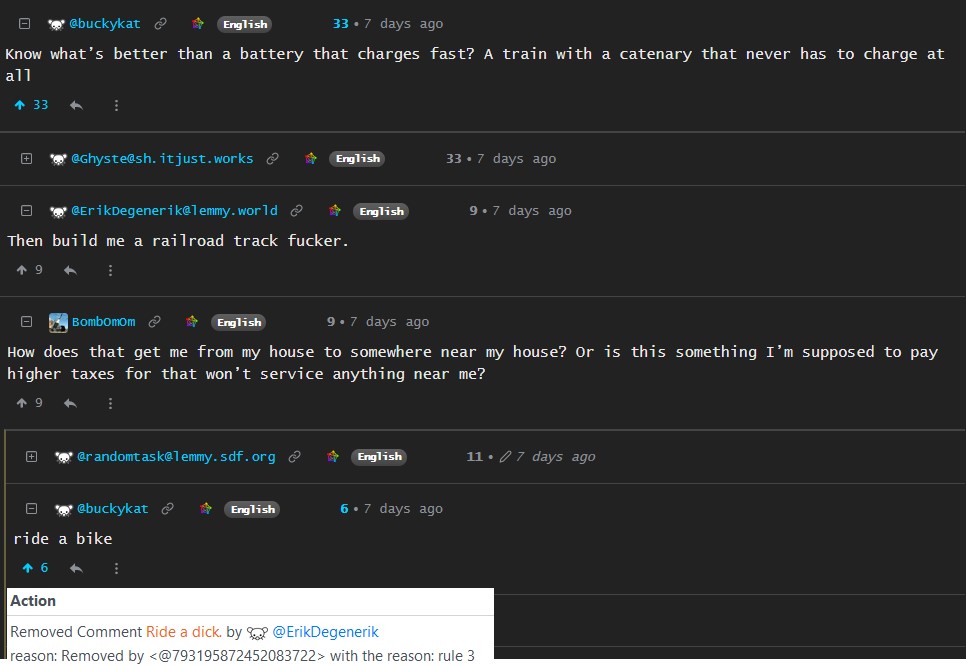the_dunk_tank
It's the dunk tank.
This is where you come to post big-brained hot takes by chuds, libs, or even fellow leftists, and tear them to itty-bitty pieces with precision dunkstrikes.
Rule 1: All posts must include links to the subject matter, and no identifying information should be redacted.
Rule 2: If your source is a reactionary website, please use archive.is instead of linking directly.
Rule 3: No sectarianism.
Rule 4: TERF/SWERFs Not Welcome
Rule 5: No ableism of any kind (that includes stuff like libt*rd)
Rule 6: Do not post fellow hexbears.
Rule 7: Do not individually target other instances' admins or moderators.
Rule 8: The subject of a post cannot be low hanging fruit, that is comments/posts made by a private person that have low amount of upvotes/likes/views. Comments/Posts made on other instances that are accessible from hexbear are an exception to this. Posts that do not meet this requirement can be posted to [email protected]
Rule 9: if you post ironic rage bait im going to make a personal visit to your house to make sure you never make this mistake again
view the rest of the comments


I think libs are under the (false) impression that roads are both completely mandatory in society AND somehow cheaper to build and maintain than public transit. Per person moved public transit is significantly more efficient per dollar but libs just don't want to know stats when they don't agree with their worldview
They kinda are in local transport to be fair. You can't transport truck loads of stuff by bike to grocery stores. This necessitates some level of automobile road to get there. What's unnecessary is regional/national roads for commerce. Most cities would still require road maintenance just for EMS and local commerce even if they had a robust public infrastructure. The good news is that buses can use these roads as well so a post-personal-car future is still viable. Roadless cities are not.
It takes 160,000 bicycles to incur the road maintenance cost of a single personal car.
Yep, and that's why most people should ride bikes and then use public infrastructure as needed. But automobiles are still necessary, unless you mean to bike in all the equipment you'd find in an ambulance.
Are we disagreeing here or are you just mentioning a statistic?
I think ambulances and firetrucks should be basically the only automobiles. Even most delivery vehicles should be replaced by either cargo bikes or by spur lines off the railroad.
Also, it's important to this discussion to draw a clear distinction between streets, roads, and stroads. Streets are destinations and can be made primarily for bikes and pedestrians, roads are routes for cars to go fast from place to place. Stroads are the cursed middle ground common to USAmerican suburbia which combine the width and car friendliness of a road with the density of destinations of a street. I don't think it's possible, or even desirable, to get rid of streets, but I think we can and should get rid of most roads and absolutely all stroads. The remaining impermeable surfaces will be drastically cheaper to maintain.
I just don't think it'd be practical to fill entire grocery stores worth of stuff on bikes. You're not dealing with a few packages of office supplies. You're dealing with entire warehouse districts worth of stuff having to move across cities. Even with reduced consumption, the amount of people needed to transport that on bikes would probably be more than the local population.
That's what trains are for. Retvrn to tradition.
Do you plan to run a train through every grocery store, stop to unload at each stop, and still expect to get everything there at the same time?
We don't live in a wildwest train town. Our cities are not built around trains and unless you plan to literally tear down the entirety of New York it will not work.
They used to be, and you can still see it in the way a lot of cities roads and former industrial cores are laid out.
That picture was from NYC during the 20s.
But surface level freight trains are not a great solution in cities, hence why they built the highline, which stayed in use until the 80s.
Scheduled freight trains running on their own grade and just stopping to switch out some containers can potentially be more reliable than semis. I have to say potentially because holy shit american freight has been hollowed out by capitalism.
edit: I don't actually think it's feasible for every place that needs more freight than cargo bikes can handle would have a train depot, but every truck that swaps containers at depots inside the city reduces the number of miles they're driving in the city and the need for giant highways cutting the city in half.
I would add special door to door transport automobiles for the special needs populations too but otherwise agree whole heartedly.